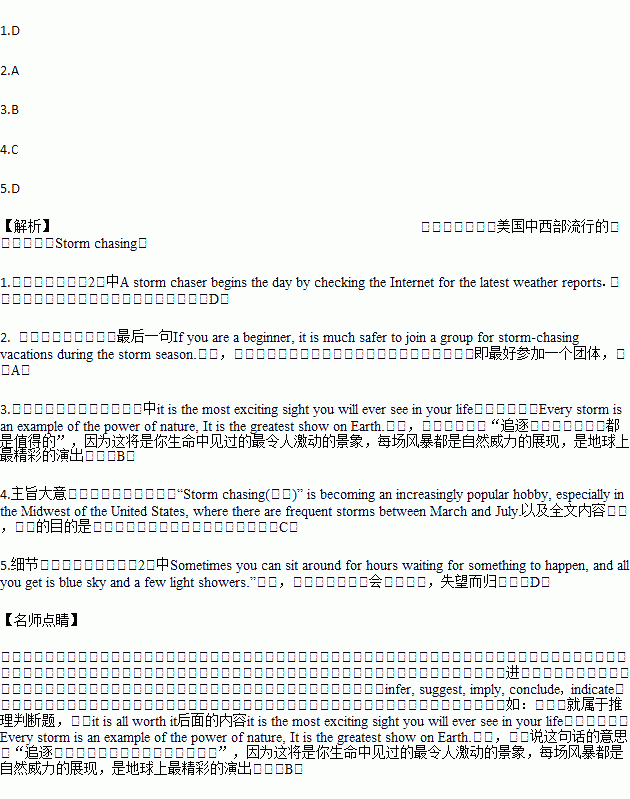题目内容
When a storm is coming, most people leave the area as quickly as possible and head for safety. But there are a few people who will get into their cars and go straight for the center of the storm. These people are willing to risk being killed by floods or 100-kilometer-an-hour winds for the excitement of watching the storm close up.
“Storm chasing(追逐)” is becoming an increasingly popular hobby, especially in the Midwest of the United States, where there are frequent storms between March and July. A storm chaser begins the day by checking the Internet for the latest weather reports, and then drives up to 1,000 kilometers to where the storm will be and waits for it to develop.
Although anyone can do it, storm chasing is extremely dangerous. The power of a big storm can throw a cow into the air or destroy a whole house in seconds. Storm chasers are also often hurt in accidents caused by driving in a heavy rain. If you are a beginner, it is much safer to join a group for vacations during the storm season.
Even then, storm chasing is not all adventure and excitement. “Storm chasing is 95% driving,” says Daniel Lynch, who spends most of his summer storm-chasing. “Sometimes you can sit around for hours waiting for something to happen, and all you get is blue sky and a few light showers.”
However, for storm chasers, it is all worth it. “When you get close to a storm, it is the most exciting sight you will ever see in your life,” says Jasper Morley. “Every storm is an example of the power of nature. It is the greatest show on Earth.”
1.For storm chasing, the first thing storm chasers do is to _______.
A. get quickly into their cars for safety
B. wait patiently for the storm to develop
C. head straight for the center of the storm
D. collect information about a coming storm
2.Beginners of storm chasing are advised _______.
A. to do it in an organized way B. to spend much more time on it
C. not to get too close to a storm D. not to drive in a heavy rain
3.By saying “it is all worth it” in the last paragraph, the author means that _______.
A. storm chasing costs a lot of money
B. efforts in storm chasing are well paid
C. storm chasing is worth hours of waiting
D. a storm presents the greatest show on Earth
4.What is the purpose of the author?
A. To appeal to more people to take the adventures.
B. To give people advice when a storm is coming.
C. To introduce a hobby called storm chasing.
D. To present difficulties of storm chasing.
5.What can we learn from the text?
A. Storm chasing is only fit for young people.
B. Some storm chasers were killed during the storms.
C. Storm chasing is becoming popular around the world.
D. Sometimes storm chasers get nothing but disappointment.

